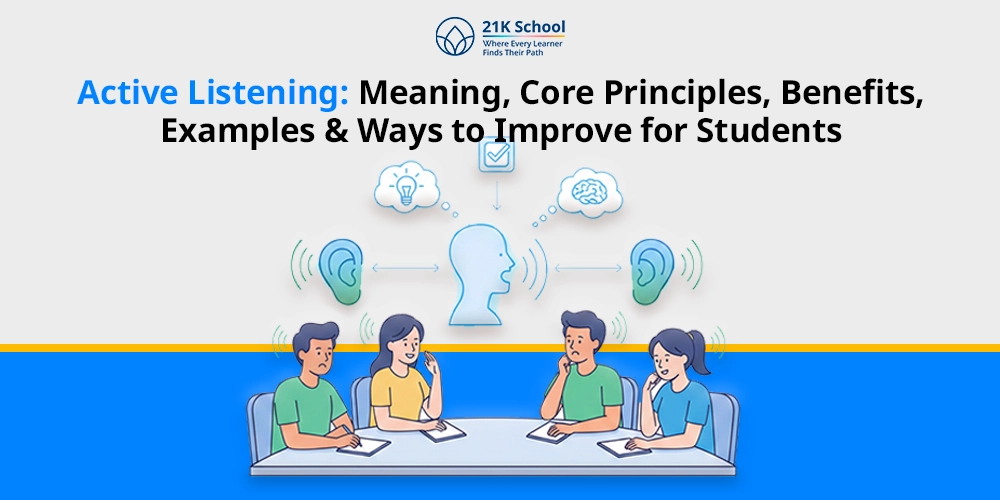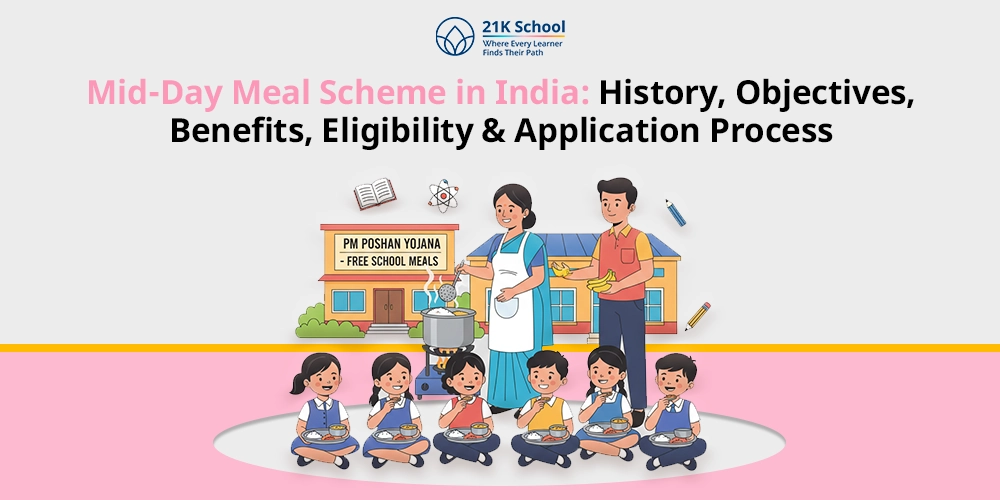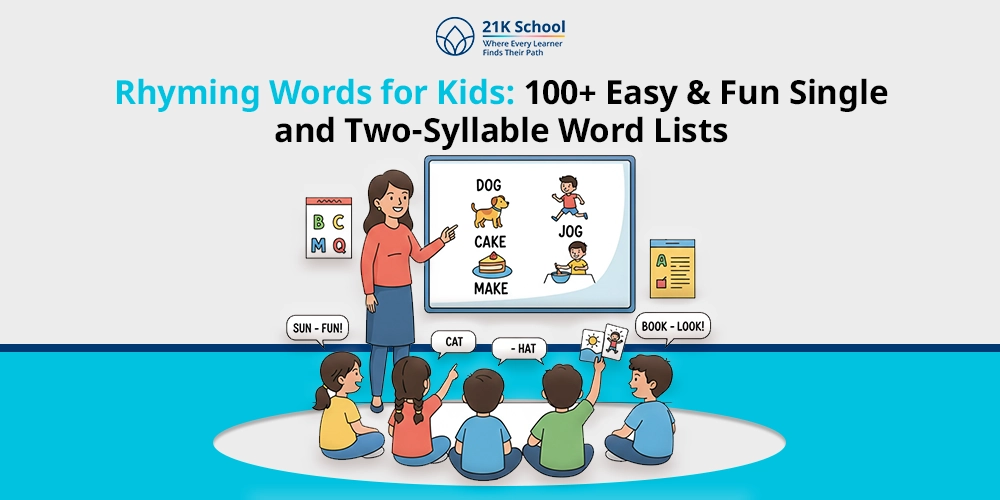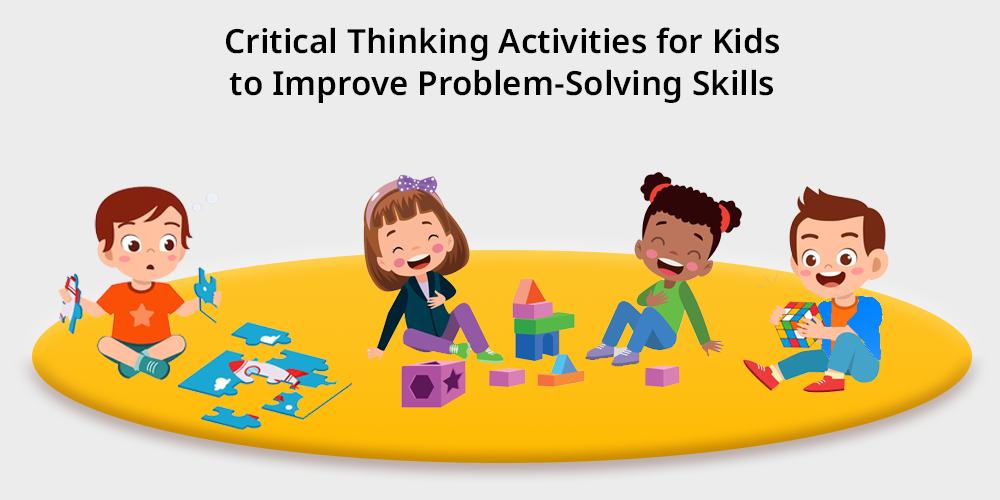
Have you ever wondered why critical thinking is essential in a child’s development?
Critical thinking encompasses the ability to think logically, rationally, and creatively, enabling individuals, especially children, to tackle problems, make sound decisions, and communicate effectively, all of which are essential for academic success and continual learning.
Critical thinking is one of the most essential parts of a child’s development. Critical thinking encompasses the ability to express thoughts clearly and confidently.
Critical thinking not only creates a strong character in children but also makes them versatile and responsible. This also helps to boost student’s mental health.
Critical thinking can be boosted by promoting various activities among students and individuals. This will give them insight into what they are best suited for.
As a parent, it is essential to encourage children to express their thoughts without any hesitation.
Table of Contents
What is Critical Thinking in Kids?
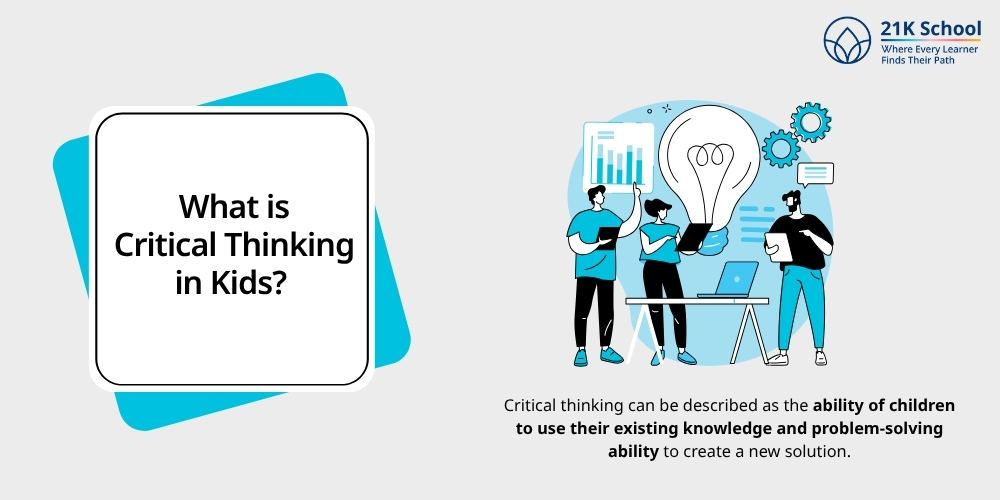
Critical thinking can be described as the ability of children to use their existing knowledge and problem-solving ability to create a new solution.
This can also be defined as the ability of children to draw solutions out of problems.
Critical thinking among students helps them to investigate new things and helps understand the world around them. Critical thinking is a cognitive process among children that helps in evaluating things and expressing their opinions and beliefs.
Critical thinking enables a child to articulate a problem, recognize underlying assumptions, assess concepts critically, and ultimately enumerate various potential causes, devise credible solutions, and analyze their validity through logical reasoning.
Critical thinking among children is divided into different types according to the age group of children. Creative activity for kids will help boost their critical thinking.
Top 14 Critical Thinking Activities for Kids
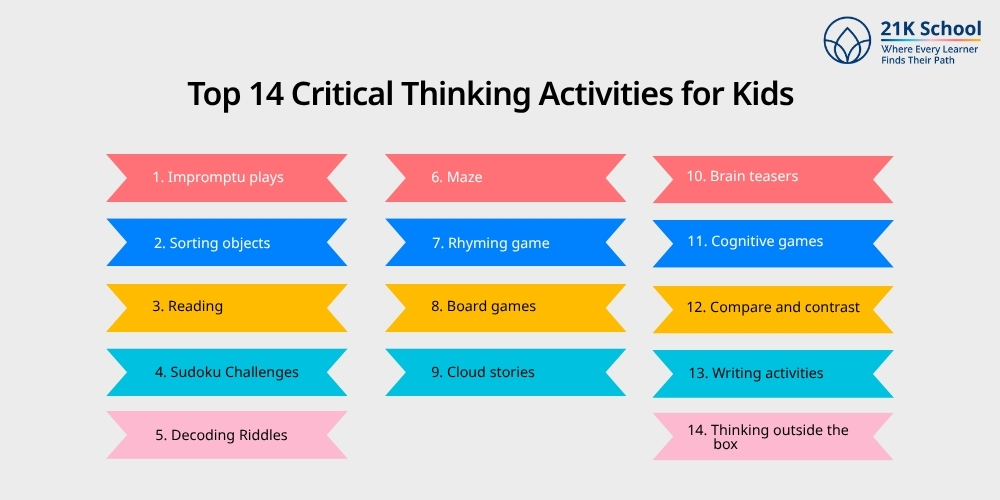
1. Impromptu plays
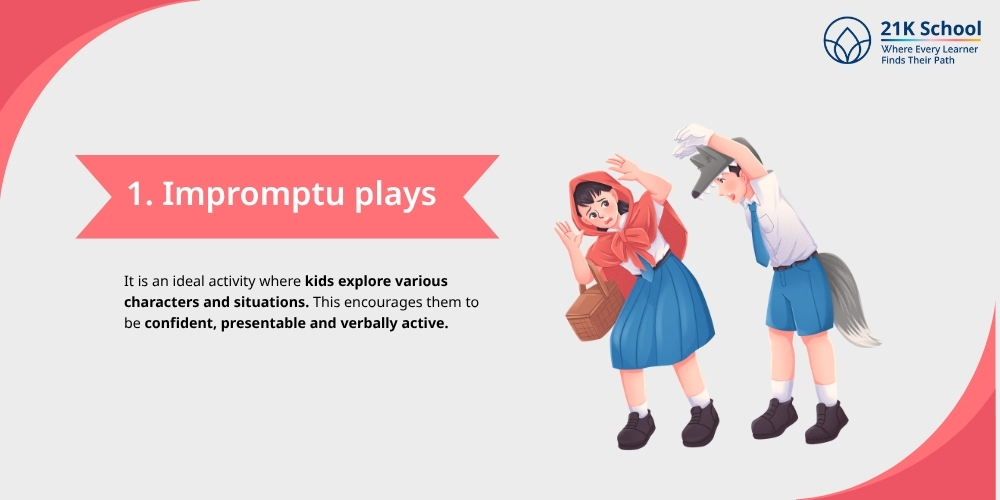
Impromptu plays is also popular as Improvisational theatre or improvisation, it is a type of theatre in which most of the play is performed by individuals with unplanned or unscripted naturally made-up by performers.
It is an ideal activity where kids explore various characters and situations. This encourages them to be confident, presentable and verbally active.
2. Sorting objects
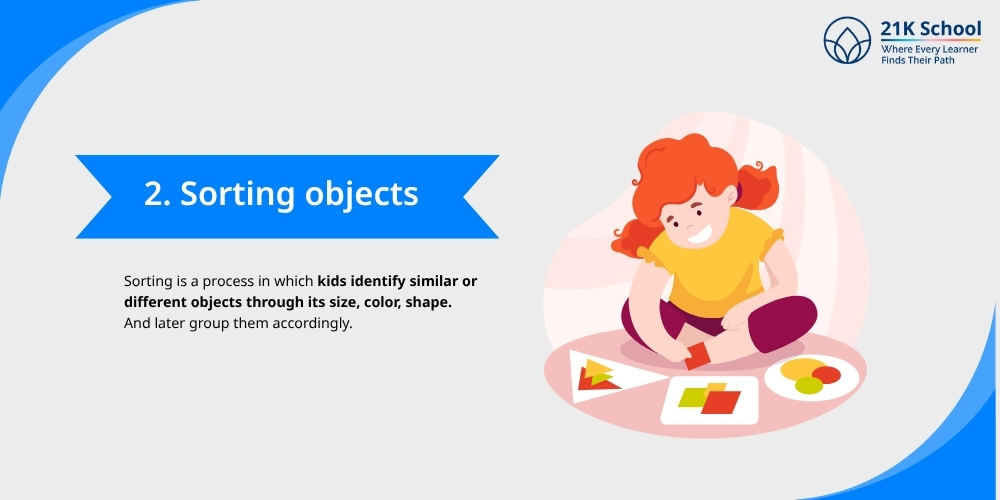
Sorting is a process in which kids identify similar or different objects through its size, color, shape. And later group them accordingly.
The activity improves kids fundamental skills and engages them to analyse and make right decisions.
3. Reading

Reading is one of the beneficial activities for every kid which helps them to develop imagination and comprehension abilities.
Facilitators or parents can ask learners to create their own story or give a summary after reading a literature lesson.
This activity is ideal for deeper thinking and perspective-taking where kids openly share their side of the story.
4. Sudoku Challenges
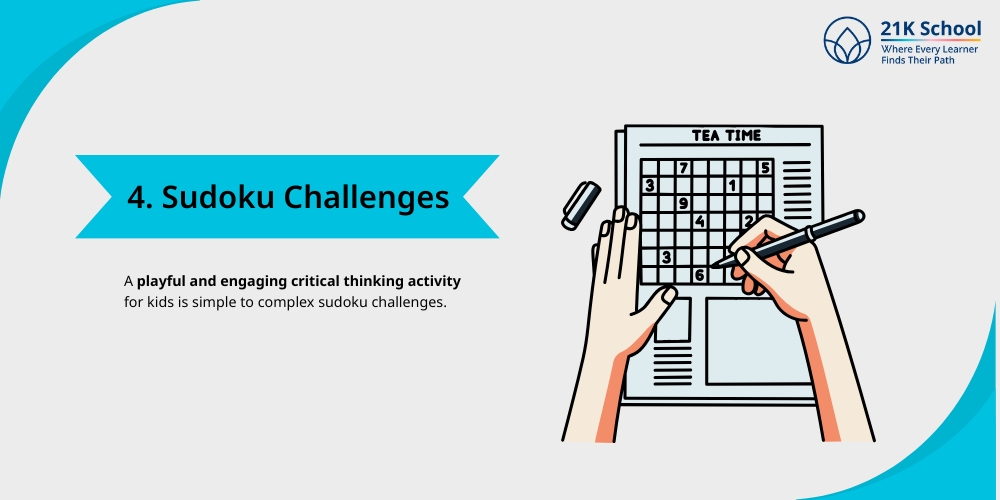
.A playful and engaging critical thinking activity for kids is simple to complex sudoku challenges.
Here, the objective is to fill a 9 × 9 grid with digits so that each column, each row, and each of the nine 3 × 3 subgrids that compose the grid contains all of the digits from 1 to 9.
It is an excellent way to boost kids’ logical reasoning, memory, and concentration. One must start with simple to complex games to understand pattern, increase curiosity and problem solving.
5. Decoding Riddles
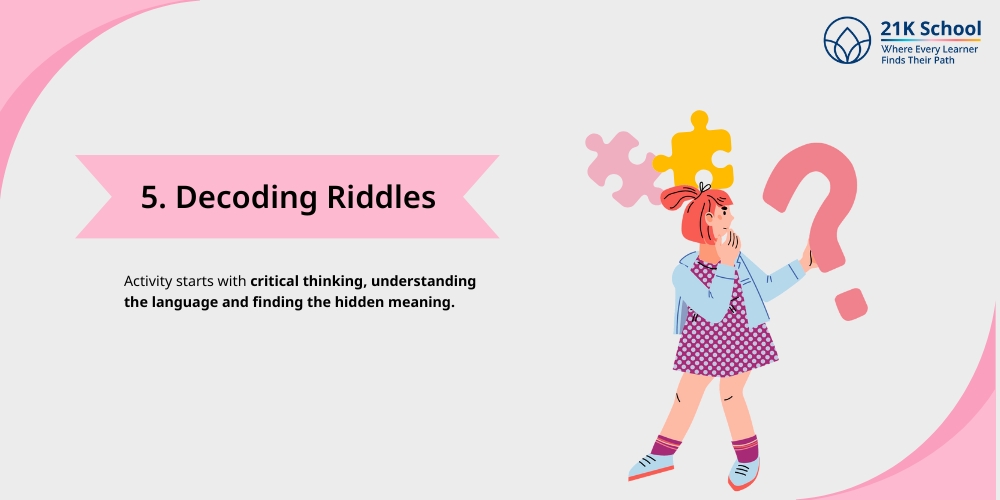
Effective critical thinking activity for kids is playing or decoding riddles. Activity starts with critical thinking, understanding the language and finding the hidden meaning.
It also improves vocabulary and helps to think beyond common answers.
6. Maze
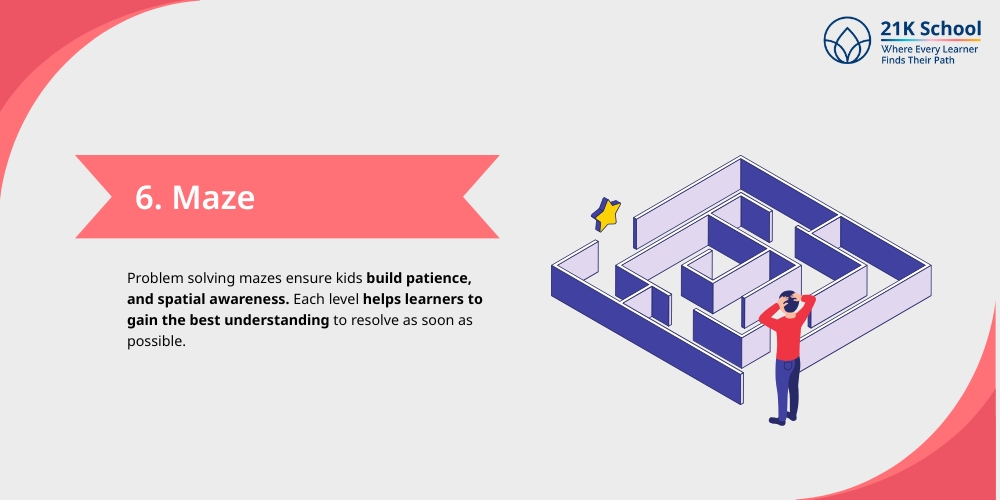
Problem solving mazes ensure kids build patience, and spatial awareness. Each level helps learners to gain the best understanding to resolve as soon as possible.
Learners can take part in competitions to engage themselves.
7. Rhyming game
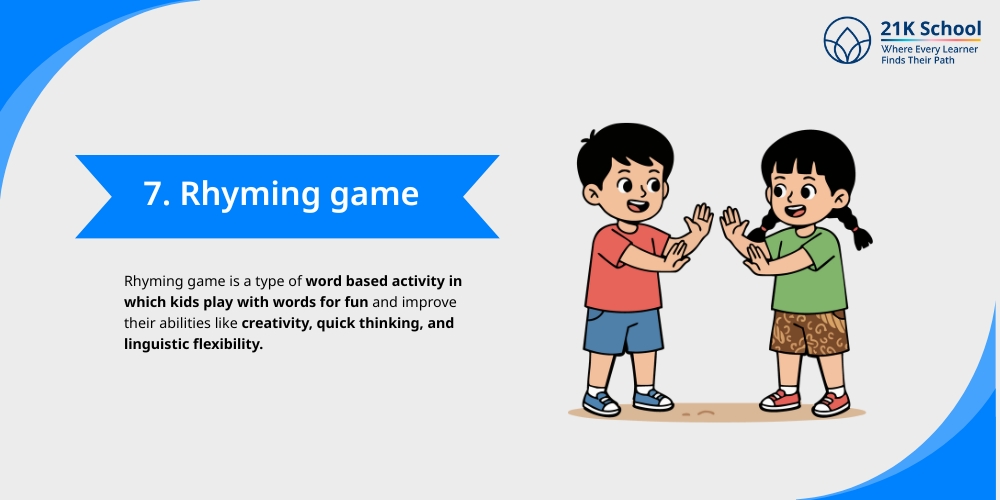
Rhyming game is a type of word based activity in which kids play with words for fun and improve their abilities like creativity, quick thinking, and linguistic flexibility.
Here, each participant gets their turn to speak their words that rhyme with a given word/phrase. It sharps players’ listening and vocabulary skills.
8. Board games
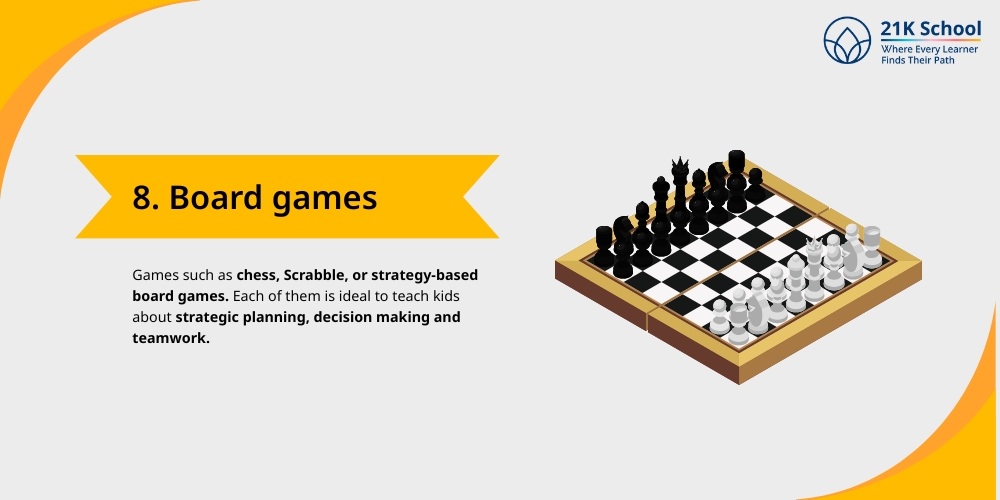
To improve critical thinking skills kids can also play various board games with friends and compete with each other.
Games such as chess, Scrabble, or strategy-based board games. Each of them is ideal to teach kids about strategic planning, decision making and teamwork.
9. Cloud stories
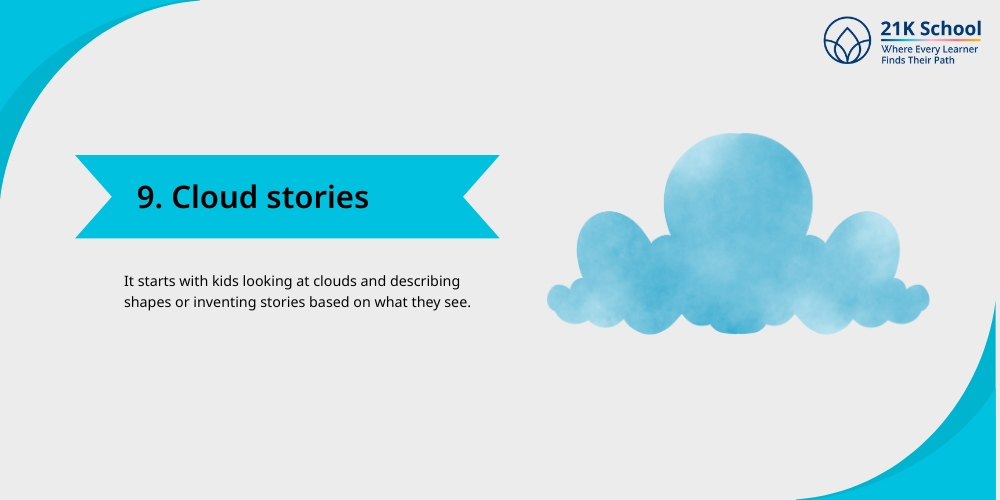
Cloud stories is an effective game for kids to improve their critical thinking abilities. It starts with kids looking at clouds and describing shapes or inventing stories based on what they see.
This improves their imagination, storytelling, and divergent thinking.
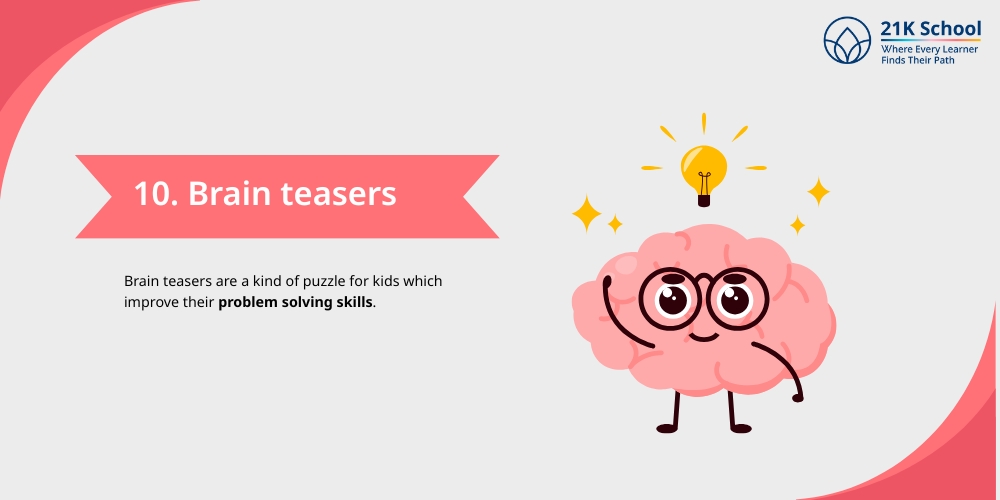
Brain teasers are a kind of puzzle for kids which improve their problem solving skills. It offers the opportunity to think differently to solve the puzzle.
Some common examples of brain teasers are logic puzzles and riddles. By this way kids find new ways or solutions.
11. Cognitive games
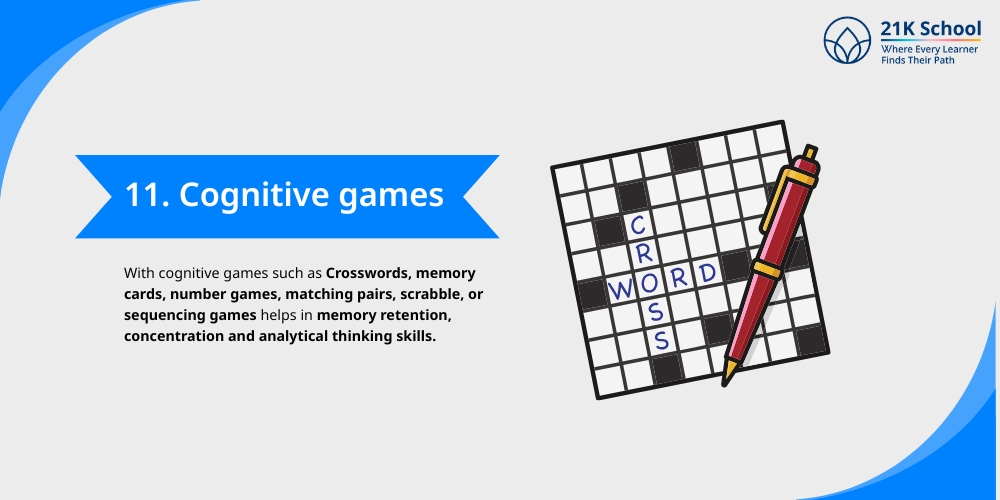
With cognitive games such as Crosswords, memory cards, number games, matching pairs, scrabble, or sequencing games helps in memory retention, concentration and analytical thinking skills.
12. Compare and contrast
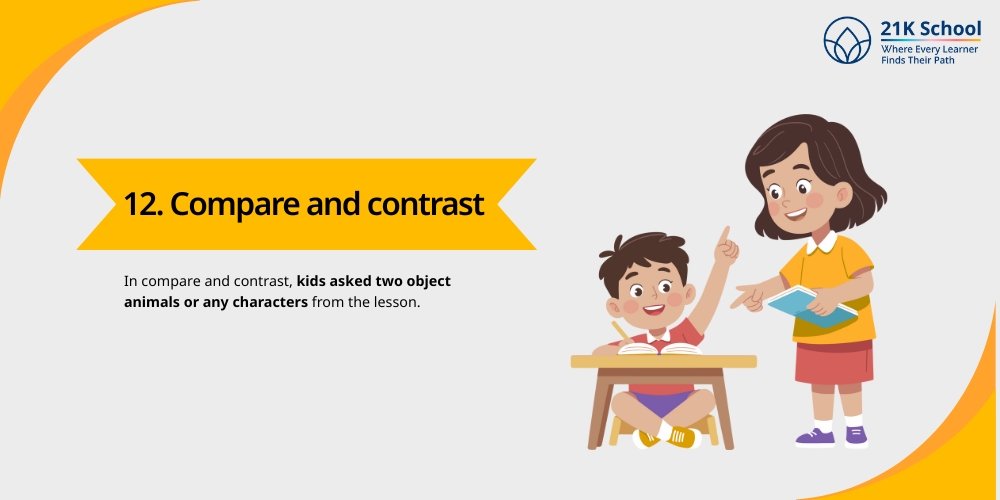
In compare and contrast, kids asked two object animals or any characters from the lesson. Find out their similarities to improve their analytical skills.
It is an ideal way to cross-check what kids understand with these characters or situations.
13. Writing activities
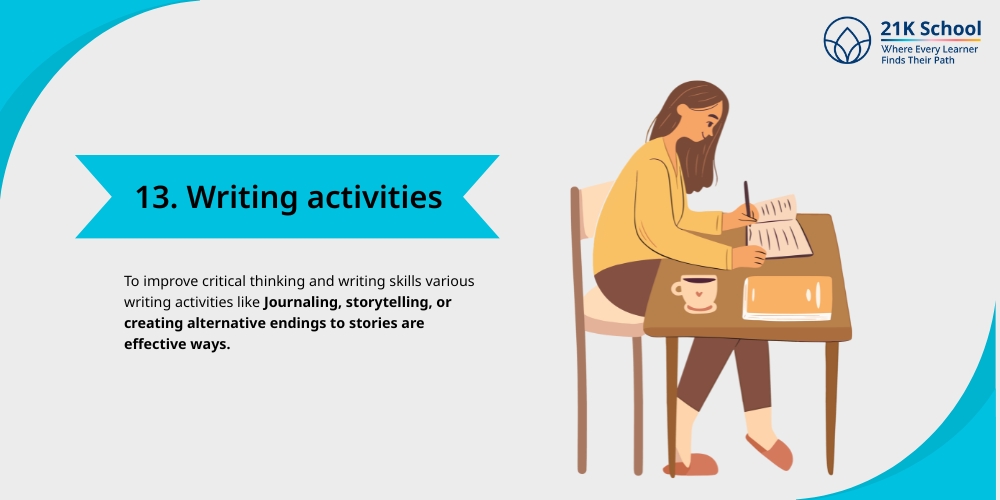
To improve critical thinking and writing skills various writing activities like Journaling, storytelling, or creating alternative endings to stories are effective ways.
By this way kids can easily structure and present their creative thinking skills, unique thoughts, and communication skills.
14. Thinking outside the box
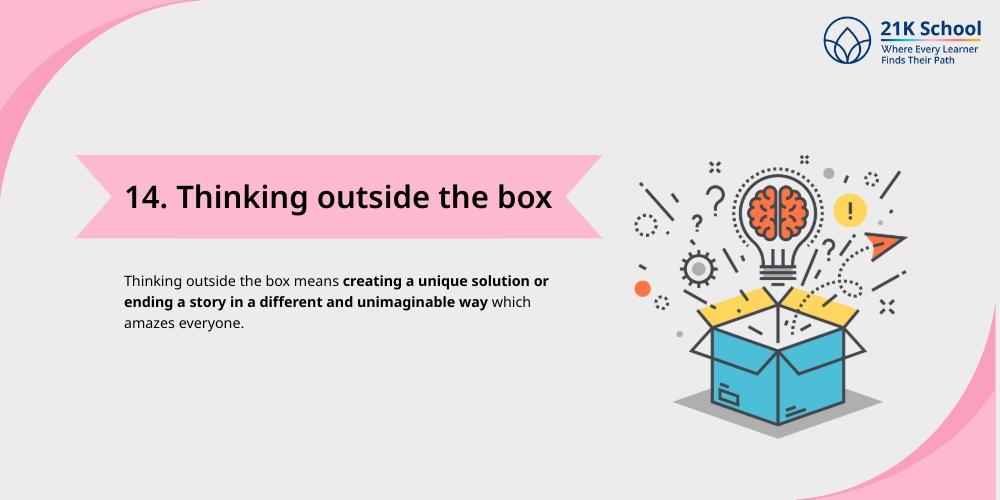
Thinking outside the box means creating a unique solution or ending a story in a different and unimaginable way which amazes everyone.
To do so learners need freedom and a positive learning environment. Encourage them to solve the problem in their own way.
Critical Thinking Activities for Kids: By Age Group
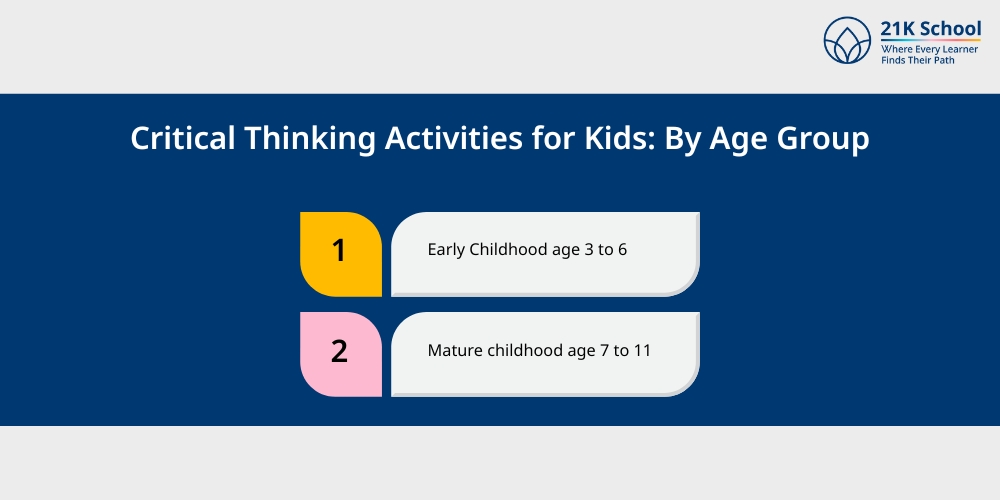
As a parent, it is essential to develop critical thinking abilities among children as the early years are the pivotal years for children to learn about and understand their surroundings.
At an early age children develop curiosity and ask a lot of questions.
This becomes essential for them to develop logical thinking. Engaging in critical thinking activities significantly assists children in analyzing the information they receive, judging its reliability, and making well-informed choices based on their discoveries.
These skills also enable children to rise above negative self-views that could limit their development and concentrate on their natural strengths instead.
Critical thinking abilities can be divided into two groups: Early childhood and Mature childhood.
1. Early Childhood age 3 to 6
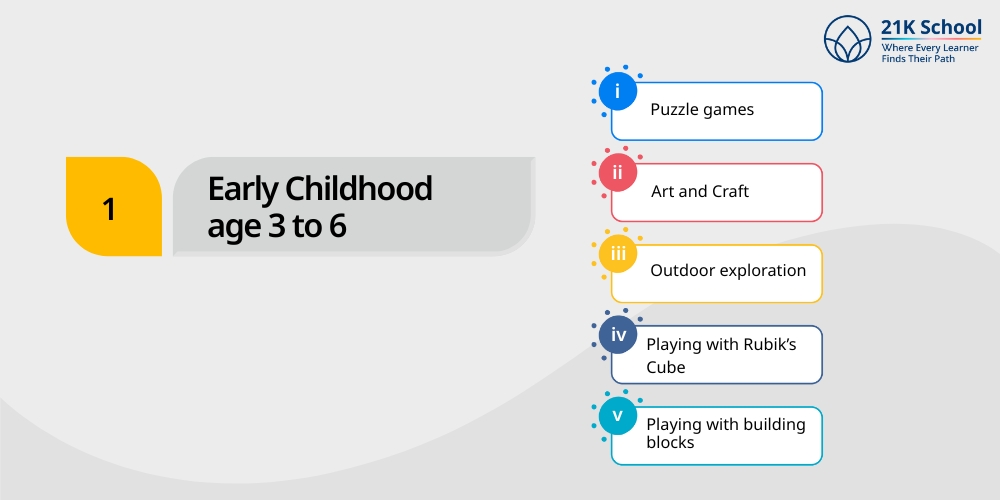
This stage is the most pivotal for developing curiosity among children.
This stage presents a great opportunity to foster their inquisitiveness and establish a basis for logical reasoning. Memory games for kids will help to boost their understanding level among children.
Here you can check the critical thinking activities for kids between the age group of 3 to 6.
i) Puzzle games:
Playing puzzle games helps in building spatial awareness among children. Through puzzles, children think critically and enhance their problem-solving ability.
This will also develop coordination between hand movements and the brain. By playing puzzles regularly, children can develop an interest in puzzles.
ii) Art and Craft:
Children at an early age develop various thoughts, and encouraging them to focus on arts and crafts will enhance their creative thinking skills.
Kids can express their thoughts, feelings, and emotions by doing painting, crafts and hobby projects. This will help in fostering a child’s ability to conceptualise idea , use imagination and create a meaningful solution.
iii) Outdoor exploration:
Outdoor activities for kids are one of the most effective ways to promote critical thinking among kids. Through outdoor activities, children will learn about small details closely and will enhance their curiosity.
Children can observe detailed things by going to nature camps, on hikes, and participating in outdoor adventures.
For example, 21K school boosts critical thinking in children by taking them on explorative walks, nature camps, hiking, and wild activities. This helps them to learn about nature and the ecosystem.
iv) Playing with Rubik’s Cube:
The Rubik’s Cube is one of the most effective ways to promote critical thinking among children. Rubik’s cube creates challenges among students and creates a positive impact on their brain as they try to solve it.
It motivates them to respond quickly, expand their creativity, and develop coherent strategies, thereby connecting imaginative thinking with logical reasoning.
v) Playing with building blocks:
Playing with building blocks helps children develop a structured balance between thinking and logical reasoning.
Integrating these activities into their everyday schedule guarantees enjoyable hours and prepares these young individuals with analytical skills that will serve them long into the future.
2. Mature childhood age 7 to 11
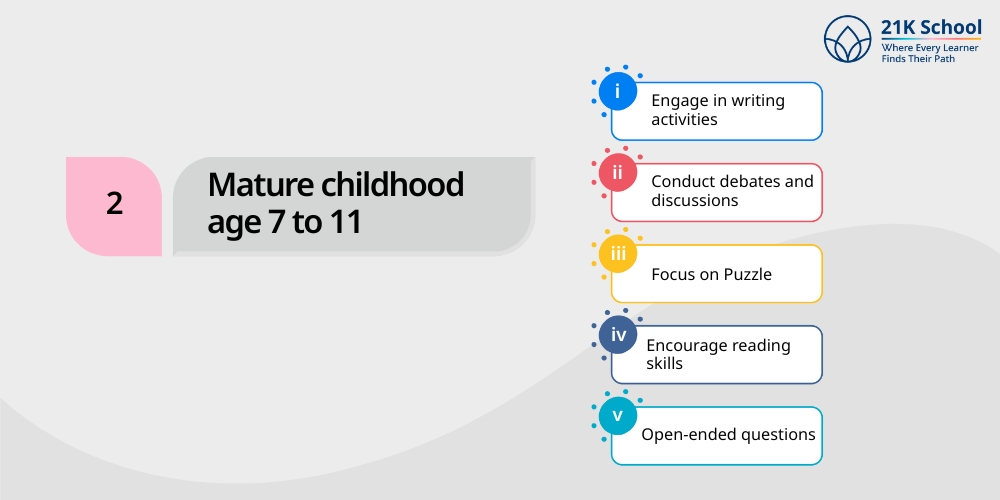
Kids grow fast, and according to their growth, kid’s cognitive abilities also develop.
With the growing mind, it becomes essential for students to be introduced to activities that help in fostering their habits of mind and help in understanding concepts more wisely.
Here you can check the critical thinking activities for kids in the age groups of 7 to 11.
i) Engage in writing activities:
Writing is the most effective way of getting quality output. Encouraging kids to participate in writing tasks like creating narratives, writing essays, or keeping journals offers meaningful opportunities for them and helps them express their emotions.
ii) Conduct debates and discussions:
Debates and discussions help children to share their thoughts and knowledge on a given topic. These also help children understand the perspectives of others, make them good listeners, and encourage respect for others’ viewpoints.
iii) Focus on Puzzle:
Playing puzzles such as Sudoku, alphabet game, maze rhyming game will boost children’s ability to think. This helps children sharpen their minds and also gives insight into solving problems without any hesitation. This helps them to take problems as opportunities.
iv) Encourage reading skills:
Reading skills are essential in young children. Reading helps them develop their imagination and boost their thinking ability. Through reading skills, kids improve their ability to understand complex emotions, fostering empathy and the skill to evaluate narratives critically.
v) Open-ended questions:
Open-ended questions are a great way to promote critical thinking. This will encourage children to think from multiple perspectives and develop critical thinking skills.
As a parent, it is essential to ask questions to your kids on various topics; this will boost kid’s confidence and help them understand broader aspects.
Conclusion
Children’s overall development and success in life depend on the cultivation of critical thinking skills. Through a range of age-appropriate activities, kids can improve their creativity, problem-solving abilities and communication skills.
From early childhood puzzle games and outdoor exploration to later childhood activities like writing, debates and reading, these activities not only enhance children’s interest but also give them the ability to articulate their ideas and comprehend different points of view.
It is essential for parents and teachers to foster an atmosphere that values inquiry and discovery in order to help kids develop the critical thinking abilities they will need to confidently negotiate the complexity of the outside world.
We give the next generation the skills they need for responsible citizenship and lifelong learning by emphasizing critical thinking.

